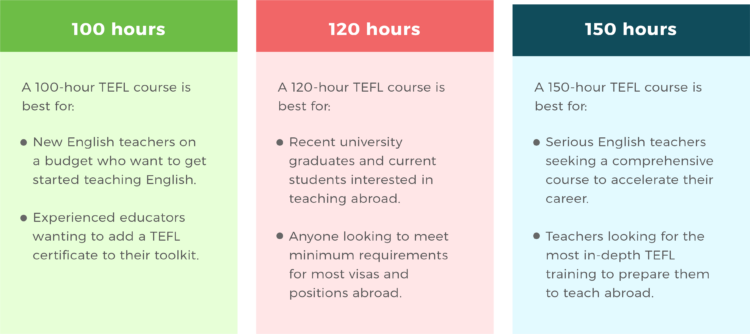You only have to Google TEFL and the number of courses that come up is mind-blowing. It might have something to do with the fact that TEFL can be a career or job to many people – a student in their gap year, a housewife teaching online around family commitments, a fresh career change for someone who wants to travel and a choice for many who are on a sabbatical midway through an established career. It is often a one-way ticket around the world for someone who has taken retirement too.
It might help to look at some of the general principles surrounding TEFL courses to help best assess which one is right for you.
- The usual average is around a minimum of 100 contact hours with at least six hours of teaching practice which is assessed. How you spread out your contact hours is up to you – some people have the time to take a short intensive course whereas others take the longer route part-time to fit around other commitments such as a current job, studying or family life.

- TEFL teaches you how to manage a teaching course with skills like planning lessons, picking relevant and interesting activities and where to find the source and supportive materials. You will however still be a relative novice once you have completed the course of your choice. Think of the course as a basic level of equipment. You will need to write timetables and lesson plans to suit your students and this takes a certain amount of experience which comes with time spent teaching
- The terminology surrounding different courses is quite confusing with much of it overlapping. Labels such as part-time, distance, evening, online, refer to the structure of the course, not the actual certification. The first thing you need to work out is which level of qualification is appropriate for you, how you study it is quite a separate issue

- TEFL is the bucket name, within that the two most recognized and desirable qualifications are the Trinity CertTesol and the Cambridge Celta. The desirability of these two qualifications is because of the strength of the exam boards behind them. Anything with the name Cambridge in it particularly carries a cachet because of the association with the University of Cambridge but it is the quality of external verification which makes these two courses head and shoulders above the rest. Other course providers can’t always offer the same checks and balances so the quality of their offering can vary. Check out any accreditation claims very carefully as some are simply just fictitious, similarly, memberships of professional bodies can look impressive but are sometimes totally meaningless
- If you don’t have any prior teaching experience before you look for your first job then a future employer will place more emphasis on where and with whom you gained your certification
In simple terms, as with many things in life, the stronger the qualification the more options are available, choices come with quality. However, with TEFL, what may turn out to be the best job might not be the one with the highest remuneration or the one demanding the highest level of TEFL accreditation. See https://www.theteflacademy.com/tefl-courses find the right course for you.
